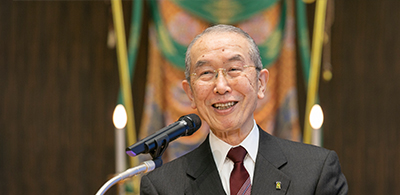Making Good Karmic Connections
September 2021

What Is the Greatest Karmic Connection?
We are living every day in the midst of various karmic connections. We could even say that through these connections, we are caused to live. Every encounter with another person, every encounter with something, and every conversation with a family member is brought about by the connections of that moment.
We hope that every one of those karmic connections will always be good. We hope that they will all be happy.
It is a fact of life, however, that things do not always happen according to our wishes. Especially when it comes to our relationships with other people, as soon as something unpleasant or disadvantageous occurs, we no longer feel that relationship is a good karmic connection.
Kurozumi Munetada (1780–1850), founder of Kurozumikyo, a Japanese new religion with roots in Shinto, said that no matter what happens, “If you think of both good and bad things as expressions of the will of the universe, then you will never suffer at all,” because “if you live in a world of being grateful for everything, you will be grateful no matter how things turn out.” In other words, all the workings of this world are entirely the arrangement of the gods and the buddhas—so among the karmic connections you happen to make, none are good or bad and, as long as your perspective is not self-centered, you will see that anything and everything is a necessary connection, for which you should be grateful.
Therefore I think that if we are able, through all of these connections, to learn and accept the truth, that is itself the original meaning of making good karmic connections.
For Buddhists, good karmic connections are those that transmit the teachings of the Buddha. Therefore, as Rissho Kosei-kai members, we are already connected through the sangha and can be called happy people, blessed with the greatest of good karmic connections.
Your Mental Outlook Is Important
Well, then, why do we want good karmic connections?
Many people may vaguely answer that good connections make them happy, but speaking from the perspective of the Buddha’s teachings, we have all been born into this world because we ourselves are buddha nature. That is the essential reason for wanting good connections. Our minds are always seeking a state in which everything is peaceful and harmonious.
For people such as us, the key to always making good connections with the people and situations we encounter—while never giving in to selfish impulses that inadvertently slip out—is an attitude of learning what each of those connections has to teach us and reflecting upon what we have realized from those connections. The Buddha explains the teachings and manifests the truth to us in many different forms, so when you notice his advice embedded in your encounters with people and events, they all become good connections.
Chapter 27 of the Lotus Sutra, “The Former Deeds of King Wondrous Adornment,” recounts the story of two sons who guide their parents to the teachings of the Buddha. This chapter describes how the father, King Wondrous Adornment, free of concerns for his social standing and losing face, listened to his sons’ suggestions with a flexible mind and became, with humility, an enthusiastic practitioner of the Buddha Way. Founder Niwano showed us that to make good karmic connections we should take the initiative in revering other people. He also said that if you abandon the petty ego that tries to make you look big, your interactions with people will form good connections. A change of mind leads to the development of a good connection, such that the child can even become the parent’s teacher in life. My ears burn with recognition when I hear someone say that I am a stubborn old man who is incapable of being flexible and accepting suggestions from his children. Of course, we are all apt to behave selfishly within our own families, so we should admonish ourselves about the importance of a mental outlook that rigorously maintains, from one day to the next, our good connections.
Cofounder Myoko Naganuma, whose Annual Memorial Day we will observe on September 10, said that “If you really try to understand other people’s feelings when you work on something together, you will be able to get along harmoniously with everyone.” She was consistent in always showing consideration for other people. Just as she told us, “In liberating other people from suffering, sincere devotion is first and foremost,” she remained true to her standard of acting compassionately. I think that she learned, from her personal experiences of suffering terribly from multiple illnesses and the sadness of living in poverty, the truth that good connections are formed through sincere devotion.
That being said, in thinking about how we should respond to the demands of those around us who are now suffering, could it be that we are overlooking some important karmic connections?



